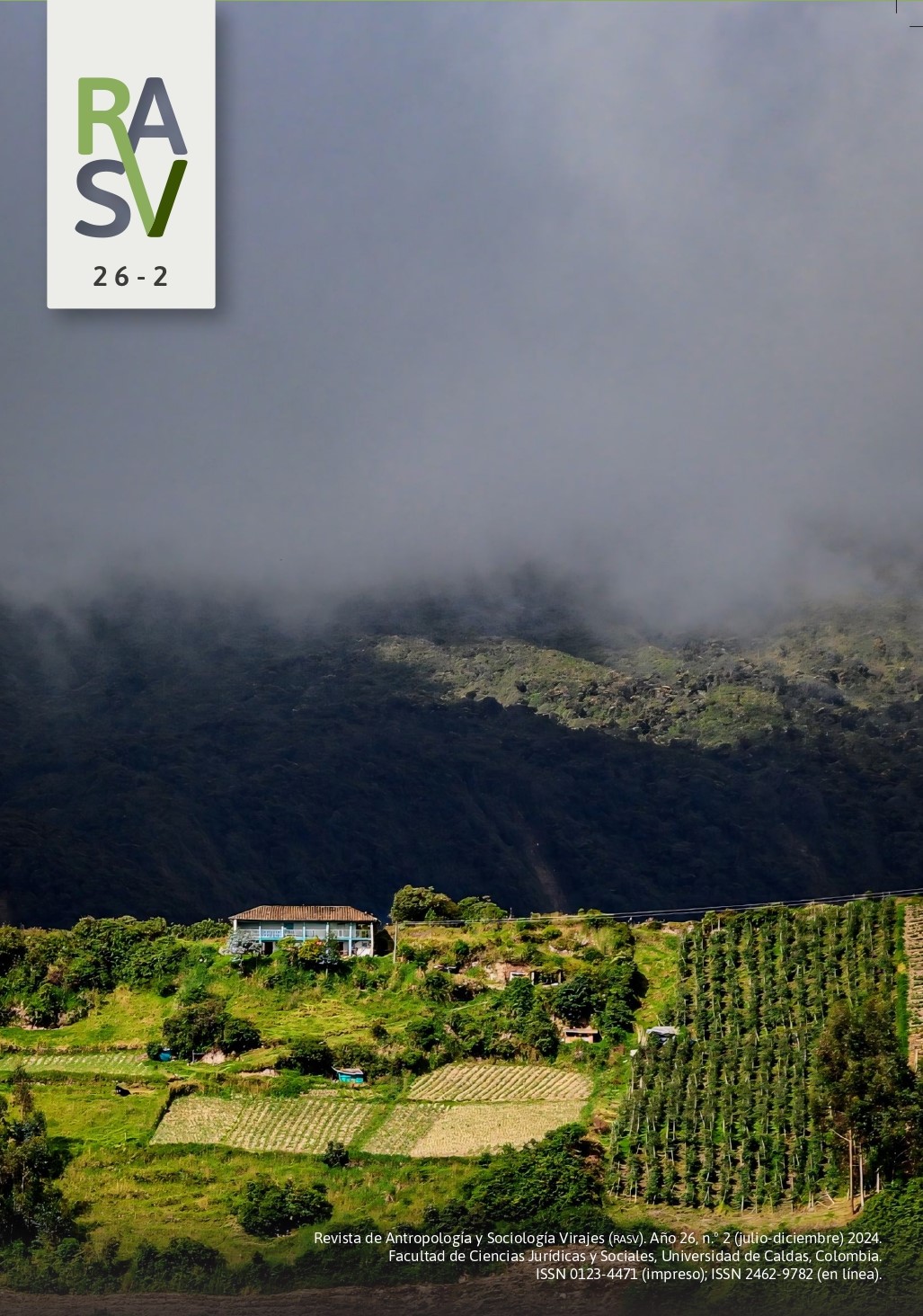Authors
Abstract
The objective of this article is to describe some variables from interviews and ethnographic interventions conducted with individuals in the city of Cartagena de Indias (Colombia), which allow us to interpret, from an emic perspective, how the experience of being poor in Cartagena is lived, or what it means to be poor in this city, contrasting data with official indicators from the program ‘Cartagena cómo vamos’ (2022). From a theoretical perspective, we interpret the results by considering poverty as part of a system of social relations, which not only relates to the income and consumption levels of those who experience it but also as a structural and historical consequence of economic, political and colonial relations. The initial findings show that the economic and emotional deprivations faced by a portion of the population in Cartagena stem from a system of racial exclusion that persists to ours day.
References
Bourdieu, P. (1999). La miseria del mundo. Fondo de Cultura Económica de Argentina. Cartagena cómo vamos. (2022). Informe de calidad de vida Cartagena. Desafíos de ayer y hoy. https://cutt.ly/KwdyDz1a
Castro-Gómez, S. (2000). Ciencias sociales, violencia epistémica y el problema de la invención del otro. En: E. Lander (ed.), La colonialidad del saber: eurocentrismo y ciencias sociales, perspectivas latinoamericanas, (pp. 145-161). Clacso.
Chambers, R. (2006). ‘What is poverty? Who asks? Who answers?’ In Poverty in focus: What is poverty? Concepts and Measures. UNDP, International Poverty Centre.
Cunin, E. (2003). Identidades a flor de piel: Lo “negro” entre apariencias y pertenencias: categorías raciales y mestizaje en Cartagena (Colombia). Arfo Editores.
DANE. (2022). Cartagena en cifras: pobreza y mercado laboral. https://www.dane.gov.co/
Essed, P. (1991). Understanding everyday racism. An interdisciplinary theory. Sage Publications.
Espinosa A., Ballestas J. y Utria, A. (2019). Segregación residencial de afrodescendientes en Cartagena, Colombia. Economía & Región, 12(1), 95-132.
Fonseca, C. (2011). Cómo se perciben valoradas y cómo se auto-valoran las personas negras en Cartagena de Indias. Discurso y sociedad, 5(4), 645-676.
Geest, S. (2018). Privacy from an Anthropological Perspective. En A. De Groot y B. Van der Sloot (Eds.), Handbook of Privacy Studies: An Interdisciplinary Introduction, (pp.413-444). University Press.
Green, M. (2009). The Social Distribution of Sanctioned Harm: Thinking Through Chronic Poverty, Durable Poverty and Destitution. En D. Hulme, T. Addison y R. Kanbur (eds) (2009) Poverty Dynamics, (pp. 309‐327). Oxford University Press.
Guber, R. (2001). La etnografía, método, campo y reflexividad. Editorial Norma.
Hulme, D., Moore, K. y Shepherd, A. (2001). Chronic poverty: meanings and analytical frameworks. Institute for Development Policy and Management, University of Manchester.
Hulme, D. y Green, M. (2005). From Correlates and Characteristics to Causes: Thinking About Poverty from a Chronic Poverty Perspective. World Development 33(6), 867-879.
Jones, S. y Tvedten, I. (2019). What does it mean to be poor? Investigating the qualitativequantitative divide in Mozambique. World Development, Elsevier, (117), 153-166.
Lipovetsky, G. (2012). The Anthropological Nature of Luxury: Interview with French Essayist Gilles Lipovetsky. https://parisiangentleman.co.uk/2012/02/03/the-anthropological-nature-of-luxury-interview-with-french-essayist-gilleslipovetsky/
Lugones, M. (2011). Hacia un feminismo descolonial. La manzana de la discordia, 6(2),105-119. https://repositorio.unal.edu.co/handle/unal/53791
Menendian, S., Gailes, A. y Gambhir, S. (2021). The Roots of Structural Racism Project. Twenty-First Century Racial Residential Segregation in the United States. Othering & Belonging Institute. https://belonging.berkeley.edu/roots-structural-racism.
Mora, A. (2016). La exclusión y la desigualdad. Transformaciones desde la política social. Colección publicaciones de Posgrados de Derecho y Ciencias Políticas. Universidad Nacional de Colombia.
Mosse, D. (2007). Power and the Durability of Poverty: A Critical Exploration of the Links between Culture, Marginality and Chronic Poverty. Chronic Poverty Research Centre. Working Paper 107. http://dx.doi.org/10.2139/ssrn.1615629
Olsen, W. (2010). Poverty as a Malaise of Development: A Discourse Analysis in its Global Context. En Poverty: Malaise of Development? (pp. 33-65). University of Chester Press.
Ortner, S. (2018). La antropología oscura y sus otros. Teoría desde los ochenta. Trad.Blázquez, G. y Díaz, M. C. Revista del Museo de Antropología, 11(2), 131-146. https://doi.org/10.31048/1852.4826.v11.n2.20804
Pérez, G. y Salazar, I. (2007). La pobreza en Cartagena: un análisis por barrios. Documentos de trabajo sobre economía regional, 24. Banco de la República.
Quijano, A. (2000). Colonialidad del poder, eurocentrismo y América Latina. En: E. Lander (ed.), La colonialidad del saber: eurocentrismo y ciencias sociales, perspectivas latinoamericanas, (pp. 201-246). Clacso.
Restrepo, E. (2016). Etnografía: alcances, técnicas y éticas. Envión editores.
Rosário, C., Tvedten, I. y Paulo, M. (2008). ‘Mucupuki’. Social relations of rural-urban poverty in Central Mozambique. R. 2008:14. Chr. Michelsen Institute.
Sánchez-Mojica, D. (2015). Pobreza, racismo y competitividad. El ordenamiento urbano neoliberal en Cartagena de Indias. Nómadas (43), 131-147.
Santos, B. (2009). Una epistemología del Sur: la reinvención del conocimiento y la emancipación social. Siglo XXI.
Segovia, R. (2007). Esclavitud y composición étnica de Cartagena de Indias. Boletín cultural y bibliográfico, 44(75), 28-55. https://cutt.ly/KwdyZ7wX
Sen, A. (1999). Development as fredoom. Anchors Books Editions.
Streicker, J. (1997). Remaking Race, Class and Region in a Tourist Town, Identities, 3(4), 523-555. https://doi.org/10.1080/1070289X.1997.9962577
Walker, R. y Chase, E. (2014). Adding to the shame of poverty: the public, politicians and the media. Poverty, Iss, (148), 9-13. https://discovery.ucl.ac.uk/id/eprint/10115005

 PDF (Español)
PDF (Español)
 FLIP
FLIP



















